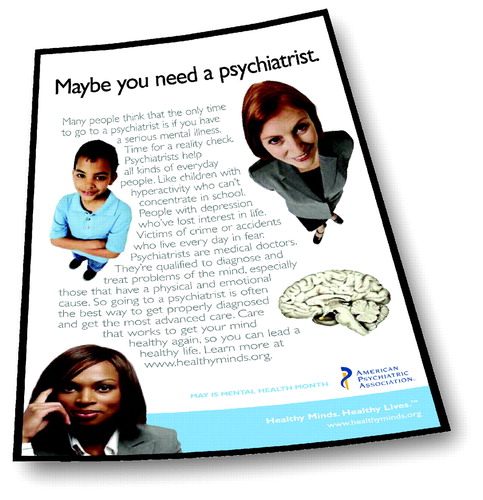APA Media Campaign Educates Public About Psychiatry
The American public will be seeing—and hearing—quite a bit of APA this month as the Association kicks off a nationwide effort to educate the public about the importance of mental health in their lives and the professionals who can best treat them when mental health problems arise.
The new campaign, titled “Healthy Minds. Healthy Lives,” is designed to reach the media and policymakers as well as the general public with the message that “psychiatric treatment works and seeking such help is a sign of strength,” said Lydia Sermons-Ward, director of the APA Office of Communications and Public Affairs.

“This campaign should help us tell the story of psychiatry and of our members,” said APA Medical Director James H. Scully Jr., M.D. “For too long we have left it to others to define who we are and what we do.”
The launch of the education effort coincides with Mental Health Month and involves public service announcements on radio and television stations and print ads in Newsweek and Family Circle magazines (see the print ad at right).
The goal of the campaign, which APA is developing in conjunction with the public-relations firm Porter-Novelli, is to undo the long-entrenched stereotypes and stigma attached to mental illness and the people who suffer from it (Psychiatric News, January 7). A key part of this, Sermons-Ward said, is to reach the people who make health care decisions for their household with the message that a psychiatrist is the professional most highly trained to help when mental health issues are a concern in the family.

The public service announcements—a 30-second spot for television and a 60-second spot for radio—have been sent to stations in the 50 largest media markets with the request that they be included in their rotation of such announcements.
In addition, early this month Steven Sharfstein, M.D., APA president-elect; Annelle Primm, M.D., director of APA's Office of Minority and National Affairs; and consumer advocate Dianne Dorlester were scheduled to conduct a series of satellite interviews about psychiatry and mental illness with the hosts of radio and television shows. Those stations can broadcast the satellite feed live or play the interview at a future date.
Results of a telephone survey recently conducted for APA in which 1,020 adults indicated their opinion of psychiatrists were sent to reporters, editors, and columnists at media outlets in those same markets (Original article: see box below).
APA also plans to use this month's annual meeting in Atlanta as a forum for gaining considerable attention for the campaign, Sermons-Ward noted. She is trying to set up a meeting, for example, with editors and reporters of Atlanta's largest newspaper, the Journal-Constitution. Banners and information about the public-education effort will be visible throughout the convention center and other annual meeting venues.
APA's district branches are also a crucial component of the campaign's success, she pointed out. All of them were sent a “toolkit” in April that includes copies of the public service announcements and print ad, a press release with key messages about the campaign, a list of “talking points,” and information that people can access on the APA Web site. That Web site,<www.psych.org>, includes a link to the campaign's Web site at<www.HealthyMinds.org>.
Sermons-Ward hopes that psychiatrists are enthusiastic about the new campaign and realize that they can play a large part in advancing its goals. The campaign's success will be enhanced if psychiatrists carry its messages to the gatekeepers of health care in particular, she noted. She described those gatekeepers as most often being women aged 30 to 54 who determine whether they or a family member receive care for a mental health problem. ▪



